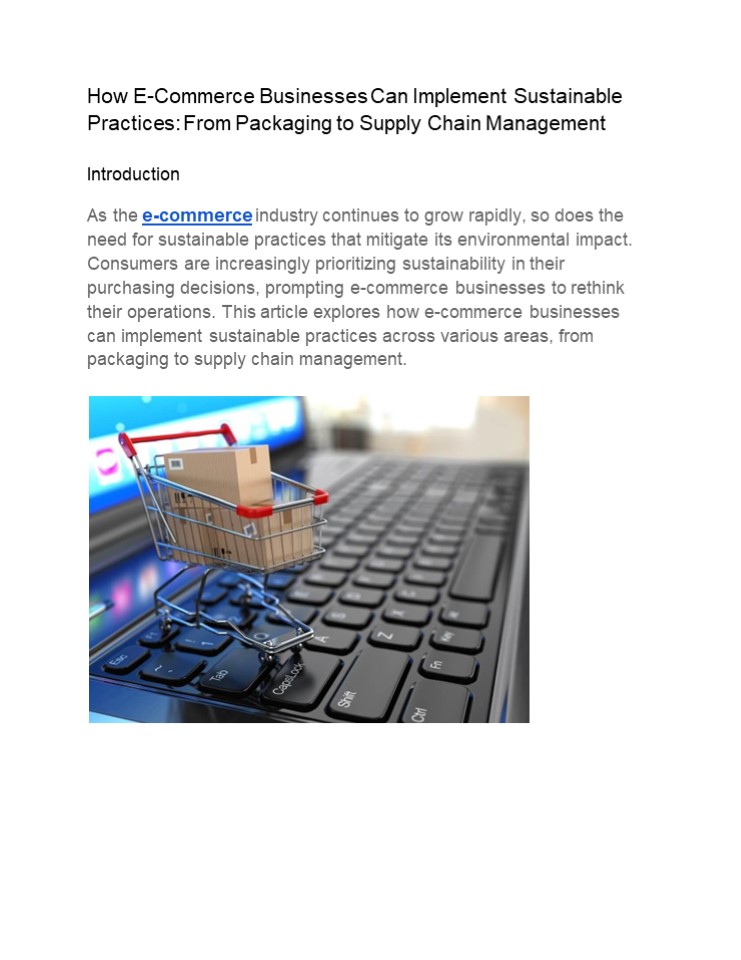E Commerce PowerPoint PPT Presentation
Title: E Commerce
1
How E-Commerce Businesses Can Implement
Sustainable Practices From Packaging to Supply
Chain Management Introduction As the e-commerce
industry continues to grow rapidly, so does the
need for sustainable practices that mitigate its
environmental impact. Consumers are increasingly
prioritizing sustainability in their purchasing
decisions, prompting e-commerce businesses to
rethink their operations. This article explores
how e-commerce businesses can implement
sustainable practices across various areas, from
packaging to supply chain management.
2
- Sustainable Packaging Solutions
- Reducing Packaging Waste
- E-commerce companies can start by minimizing the
amount of packaging used in their shipments. - Right-Sizing Packages Using appropriately sized
boxes for products to reduce excess material. - Minimalist Packaging Design Eliminating
unnecessary packaging elements, such as plastic
fillers and excess tape. - Eco-Friendly Materials
- Switching to sustainable packaging materials can
significantly reduce a companys carbon
footprint. Options include - Recyclable Materials Using cardboard and paper
that can be easily recycled. Biodegradable
Plastics Implementing biodegradable or
compostable materials for packaging that breaks
down naturally. - Reusable Packaging Offering customers the option
of reusable packaging solutions that can be
returned for future shipments. - Sustainable Product Sourcing
- Ethical Sourcing
- E-commerce businesses should prioritize sourcing
products from suppliers that adhere to ethical
and sustainable practices. This includes - Fair Trade Practices Ensuring that suppliers
provide fair wages and working conditions for
their workers. - Sustainable Materials Choosing products made
from renewable resources, such as organic cotton
or bamboo.
3
Promote Local Delivery Offer options for local
delivery to minimize shipping distances.
- Efficient Supply Chain Management
- Optimizing Logistics
- E-commerce businesses can improve the
sustainability of their logistics operations by - Consolidating Shipments Combining multiple
orders into a single shipment to reduce the
number of trips required. - Utilizing Eco-Friendly Transportation
Incorporating electric vehicles or partnering
with shipping companies that prioritize
sustainable practices. - Implementing Technology
- Leveraging technology can streamline supply chain
processes and reduce waste - Inventory Management Software Using advanced
inventory systems to prevent overstocking and
minimize waste. - Data Analytics Analyzing data to optimize routes
and reduce fuel consumption during
transportation. - Carbon Offsetting Initiatives
- E-commerce businesses can take responsibility for
their carbon footprint by investing in carbon
offsetting initiatives. This may include - Tree Planting Programs Contributing to
reforestation projects that absorb CO2 emissions.
Renewable Energy Projects Supporting projects
that focus on wind, solar, and other renewable
energy sources. - Engaging Customers in Sustainability
4
Conclusion Implementing sustainable practices in
e-commerce is not only beneficial for the
environment but can also enhance a brands
reputation and attract conscious consumers. By
focusing on sustainable packaging, ethical
sourcing, efficient supply chain management,
carbon offsetting, and customer engagement,
e-commerce businesses can play a significant role
in promoting sustainability while remaining
competitive in the market. Embracing these
practices is essential for a more sustainable
future in e-commerce.

